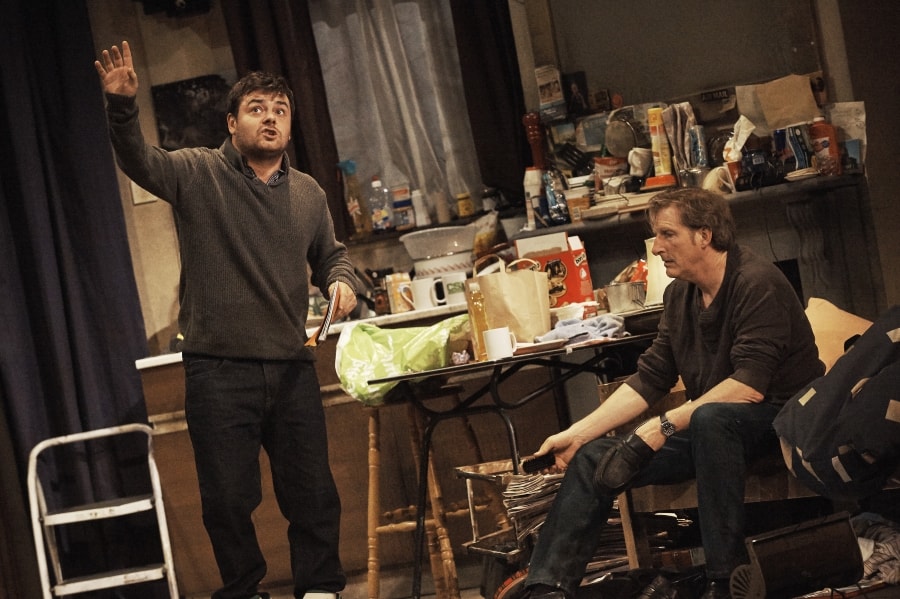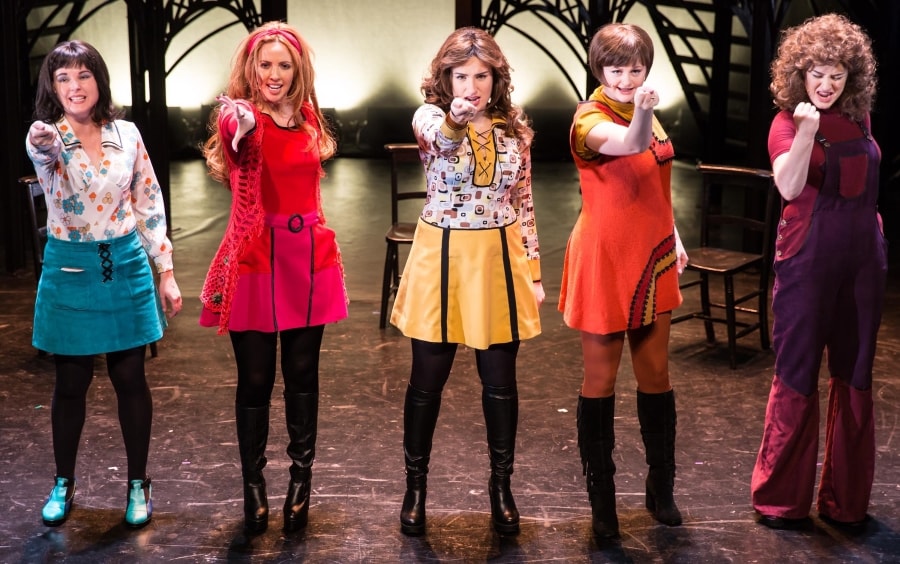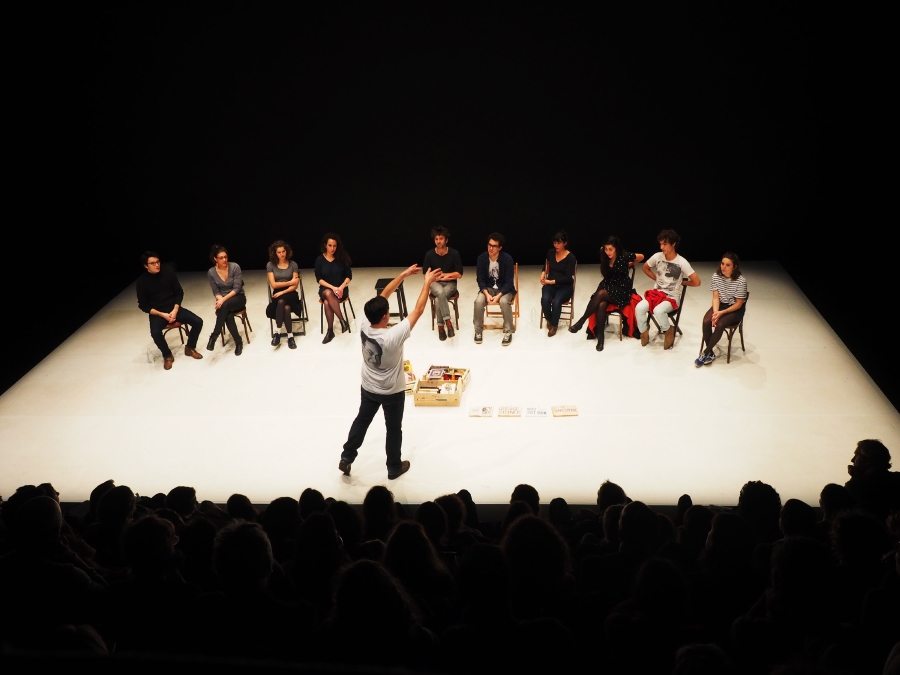My appetite whetted by Origin Theatre’s First Irish Theatre Festival in New York City last September, I arrived in Dublin later in the month hungry for more. Dublin Theatre Festival is more compact than the famous fêtes in Edinburgh or Avignon, but a similar quandary applies: How to navigate the offerings when opportunity outpaces available time? Still, I saw 11 shows in 9 days—an impressive breadth of new Irish work, with a smattering of the international.
I also found time to talk to festival director Willie White, a dashing Clark Kent figure who speaks with caffeinated rapidity. He said that while the fest attracts plenty of out-of-towners, he focuses on the locals. “If it’s good, then hopefully other people would be interested. I’d rather the festival be authentic, rather than playing to what I imagine an audience would like.”
Indeed, 62 percent of attendees are Dubliners, while some 13 percent come from other areas of Ireland and “a healthy contingent” of 26 percent from abroad, mostly from the British Isles and the U.S. Demographics span all ages, with a slight preponderance of the over-50 set, but White is emphatic that the more adventurous offerings don’t appeal only to young audiences. Older patrons, he noted, have been schooled over many years to have catholic tastes. Also attending are scouting presenters—primarily from the USA, U.K., and Australia.
White’s own tastes run toward such American artists as the Wooster Group, SITI Company, Young Jean Lee, Elevator Repair Service, New York City Players, and Nature Theater of Oklahoma, but he curates to achieve variety, insisting: “I don’t just put a festival on for me. I put the festival on for many people who could be interested in many types of theatre. Also I put a festival on for artists, so they can both be influenced and have a place to show their work.” He tries to balance a sense of “responsibility to give a platform” to more experimental theatre with the mandate to support new and emerging Irish artists, and to advocate for them internationally.
The DTF’s year-round staff of 7 produces the festival on a modest budget of 2 million Euros, down from 4 million in previous years, with the lion’s share of funding coming from the Arts Council of Ireland. Ever optimistic, White focuses on the upside: “Because we’re not cosseted by a lot of funding, that keeps us real—that keeps us honest,” he says. “We rely a lot on box office, so I only take on risks I can afford.” The riskier stuff goes into the smaller venues, which sell out quickly. For a large house like the 1,000-seat Gaiety, careful thought goes into booking a show that will sell a full 14 performances.
Though White insisted “there are no no-brainers” in programming, the festival opened at the Gaiety with as close to a sure thing as a producer could want: Conor McPherson’s The Night Alive. “I saw the play in London and thought, a Dublin writer and a play set in Dublin—we have to do it.”
Druid, which participates roughly every two years, was not represented this season, but I was able to check out the Abbey and quite a few small and indie spaces. Here are some brief notes to give a little taste of what was on the menu.

At the Abbey’s second stage, the Peacock, was Shibboleth by Stacey Gregg—one of only 5 plays by women out of 28 offerings. (To be fair, many others were collectively devised by groups that included women.) In this metatheatrical fantasy of contemporary Belfast, residents cling to the legendary Troubles, but find their romantic assumptions are based on misapprehensions. Construction workers are building “Peace Walls,” which are in fact barriers to protect new residences from the sight of any unsightly poverty, desperation, or immigrants. The wall is personified by a woman who sings, “Build me!”
The lads’ xenophobia is provoked by the appearance of Yuri, a Polish immigrant, and his attractive daughter. Violence is expected, but what surprises are tender moments of humanity. There’s a lot going on in this ambitious, eclectic piece, and one could criticize it for being messy, but to me it felt like a welcome blast of energy, playfulness, and authenticity.
In Gavin Kostick’s At the Ford, two brothers battle—physically and otherwise—over the remnants of the family’s crumbling empire after their parents’ suicide. The play is dense with references to Irish folklore, which went over my head, but the play’s exploration of Ireland’s boom, bust, and debt hardly felt remote.
The True Story of Hansel and Gretel by Theatre Lovett retells the fairy tale, mining its cannibalistic implications and achieving true creepiness, with a succession of sibling pairs replicating the departure from home, penetration of the forest, and encounters with evil.
Rough Magic’s The Train is a new musical account of a 1971 attempt to flout birth control restrictions imposed by the Catholic church and the Irish state by importing prohibited contraception. On-the-nose songs include “Gender Politics” and “If We All Pull Together,” but the best part was Clare Barrett as Aoife, a latter-day Eve reluctantly possessed by the spirit of feminism, who transforms from dutiful wife to luscious philistine sexpot, and who refuses to pretend she’s taking the pill for “menstrual irregularities.”

At Dead Centre’s Chekhov’s First Play, the audience finds headphones at each seat. A young man comes out and begins to speak, but we can’t hear him; he motions for us to put on the headphones. “You’re probably wondering why you’re all in headphones,” he begins. “The play is very complicated and messy, so I thought it’d be good to have a director’s commentary so I could explain what’s going on.” This is writer/director/performer Bush Moukarzel, a pompous but sincere figure, eager to supplement the deficiencies of writing, performance, and audience. “It’s not a good play, but it’s hugely ambitious,” he tells us. Later: “You’re probably missing the key themes.” Responding to an actor’s choices: “He’s ruining it.”
Interpolations echo Chekhov’s themes and locate the fine line between the pathetic and the risible. The director—as pretentious, fragile, and laughable as young Treplev—removes his headset and dashes off to have a nervous breakdown or perhaps even attempt suicide. (This company was in NYC last season with the well-received Lippy.)
As for the big-house offerings, McPherson’s The Night Alive begins provocatively with a man helping clean up a woman covered in blood. Con artist Tommy and his childlike sidekick, Doc, reside in a grungy basement flat, but Aimee, the prostitute with a heart of gold, proves to be an underwritten cipher, in a play I found hollow and formulaic (though audiences seemed to love it).
The legendary Abbey, Ireland’s national theatre, offered Wayne Jordan’s new version of Sophocles’ Oedipus. The adaptation’s diction alternates between poetic and profane, with our king shouting at Creon, “Fuck you!” When Creon reluctantly and takes the crown, he exhorts the writhing, blind, half-naked tragic hero to “Let go!” and Oedipus, after torrents of verbosity, replies, “Okay.”
Among the imports, the Belgian company tg STAN (Stop Thinking About Names) brought an energetic deconstruction of Chekhov’s The Cherry Orchard. This contemporized and presentational take made us as conscious of the theatrical company at work as of the play it inhabits. An actressy Ranyevskaya air-kissed everyone in sight; the performers directly addressed the audience and privileged invention over nostalgia.
Clôture de l’amour featured French author/director/choreographer Pascal Rambert as the male half of a couple who entered the playing area and took precise positions opposite each other. For much of the play, the man verbally abuses the woman; then they change places and she reciprocates. The play was billed as an “intense and raw investigation into the nature and purpose of human relationships”; raw and intense I got, not so much the investigation.
In Wallflower, created by the Manchester company Quarantine, three performers try to remember every dance they’ve ever done. The notion of “dance” is applied loosely, and includes small repeated movements, such as a father moving his little daughter to the inside of the street when walking. Moments of spontaneous discovery alternate with unsuccessful attempts at remembering. This show was noteworthy as one of the few productions I saw at the festival with performers of color.
The most profound experience for me was the 90-minute By Heart, in which the irresistible Portuguese playwright/performer Tiago Rodrigues, director of the Portuguese National Theatre, teaches Shakespeare’s “Sonnet 30” to 10 audience members in full view of the audience. Between lines, Rodrigues tells stories about instances when memorizing literature was a subversive act that preserved forbidden culture and freedom in times of oppression. He invokes Boris Pasternak and Fahrenheit 451, and quotes George Steiner: “Once 10 people know a poem by heart, there’s nothing the KGB, the CIA, or the Gestapo can do about it. It will survive.” And he tells the story of his grandmother, to whom he sends crates of books; she reads them all until her eyesight begins to fail and she must decide what single work of literature she can store in her memory to revisit at will.
In the end, it all comes together, and the recitation of the sonnet—which by now the audience too has learned by heart—becomes a profound act of defiance and reverence.

My experience overall at DTF was more relaxed and intimate than visits to larger festivals. I confess I missed some of the summertime excitement of Edinburgh and Avignon, which is more like a big treasure hunt— streets packed with street musicians, performers hawking their shows, and civilians, programs and pencils in hand—trying to suss out what’s unmissable.
Dublin’s fall festivities are more discreet, less frantic. The festival is housed in a modest building, and most of the performances take place in the once dilapidated, now trendy Temple Bar area. While I was delighted that an army of volunteers was recruited not from theatre but from retired teachers, solicitors, bankers, students, computer programmers—all engaged by their love for theatre and pride of place—I found that the average Dubliner, despite the town’s small size, knew only vaguely if at all about the festival.
But for more than 50,000 of us, most attending for an average of 3 of its 18 days, it was still a plentiful buffet, and a satisfying initiation to a festival and a city to which I will return.
Susan Jonas is a dramaturg, playwright, producer, and teacher.


